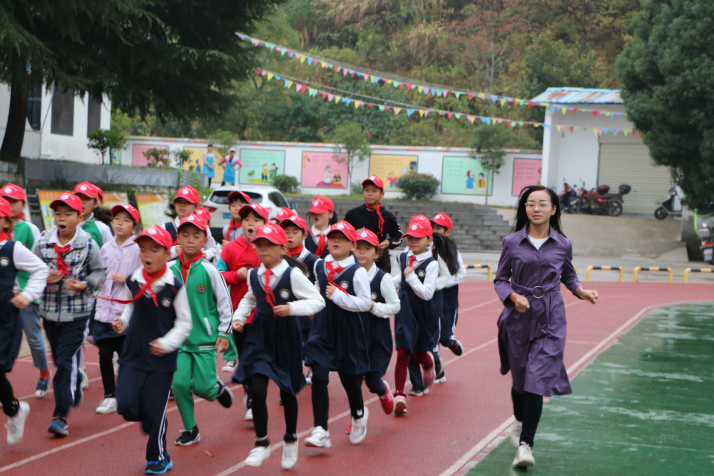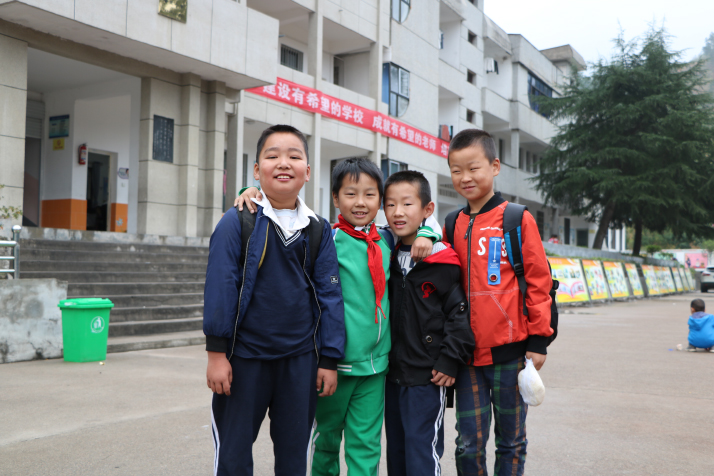|
||||||||||
| Home Nation World Business Opinion Lifestyle ChinAfrica Multimedia Columnists Documents Special Reports |
|
||||||||||
| Home Nation World Business Opinion Lifestyle ChinAfrica Multimedia Columnists Documents Special Reports |
| ChinAfrica |
| Spirited Educator |
| A young teacher shows grit and determination to carry on the proud Project Hope legacy |
| By Hu Fan | VOL.11 November ·2019-11-04 |

Headmistress Fang Rong joins the morning exercise at Luotian Hope Primary School in Luotian County, central China's Hubei Province (HU FAN)
It's 6 a.m. on a mid-October morning and the temperature is dropping fast on Dabie Mountain. As she does every school day, Fang Rong, Headmistress of Luotian Hope Primary School in central China's Hubei Province, waits on the playground for students from grade three to six to gather for their morning exercise. The students are boarders at the school during the week and only head home on weekends. This saves on the long travel time, as most students live great distances from school.
With the help of Project Hope, the school was built in 1991 and was the fourth Hope Primary School built in China and the first in Hubei Province. Located in Luotian County on Dabie Mountain, an impoverished county on the list of the national poverty alleviation program, the school is surrounded by mountains and most of its students are from villages up to 10 km away.
Fang became a teacher at the school in 2009, after graduating from a program dedicated to training teachers for rural areas. Conditions are harsh in this remote school and many of her colleagues have left over the years. Fang, however, stayed, and has now been part of the school for 10 years.
"The school has an extreme shortage of teachers, especially young teachers. If I was to leave, it would disrupt the operation and there would be no proper teaching," she told ChinAfrica.
Over the years, the school has faced a severe shortage of teachers, meaning Fang has to teach 10 subjects, including mathematics, English, music and art. Last year, she was appointed headmistress of the school, quite a challenge for this 29-year-old.

Students pose for a photo at Luotian Hope Primary School (HU FAN)
Mentor makes a difference
Fang's connection with the school started in 2002, when she became a sixth grader in the school. This was because her original primary school in a nearby village was shut down during China's rural education reform, which saw students being reallocated to better equipped schools.
At that time, money was tight in her family, which depended on her father's income earned on the construction fields in east China's metropolis Shanghai. She had two younger brothers who were also at school and a grandmother hospitalized due to a stroke. To ease the burden, Fang was thinking of quitting school and starting a job, as many rural girls of her age did.
It was the help and encouragement of her teachers at the Luotian Hope Primary School that changed her mind. In particular, she recalled how Zhang Xinqiao, the head teacher of her class, mentored her. Knowing she was interested in writing, he suggested she write down her thoughts in a notebook as a way of relaxing anxieties. Zhang wrote "rising sun" on the cover of Fang's notebook, meaning that life is as hopeful as the rising sun, which is also the symbol of Project Hope.
After primary school, Fang continued her education and was later admitted into a teacher training program. When the time came for her to decide which school to be placed in, unlike some others who requested schools in the township or the county seat which had better conditions, she asked to go to the Hope Primary School and her request was approved.
"I knew how this school can impact the life of children from the villages, and I wanted to be part of it," she said.
Passing it on
By choosing the school, Fang committed to a hard life for herself. As one of only a few young teachers, her workload is high. Of the 30 class hours a week, Fang often teaches more than 20 of them. In addition, each Wednesday and Thursday, she rides a motorbike to teach English at another two satellite teaching sites of the school, one of which is over 10 km away.
Fang seldom complains about these hardships. To her, the real challenge is improving the levels of the poorly performing students - a result of insufficient emphasis on education in the villages.
Like most of China's rural areas, parents in these villages migrate to big cities to find work. The children are left in the care of their grandparents. "Many grandparents don't value education, because based on their experience, they think they can make a living without proper education," she said.
According to Fang, in her mathematics class for sixth graders, new students often can't recite the multiplication tables, a basic requirement for lower grades. And despite it being the last school year for these students, she never gives up on them. Instead, she gives them extra lessons in her dormitory after school so they can try to catch up.
Having been in a similar situation as a child, Fang understands the importance of patience and guidance from teachers. By referring to her own childhood, she tells them how education can change the fate of a village child. The results are impressive. "Some students who came here with scores of 30-40 were able to score above 80 in the final test one year later," she said proudly.
Retaining teachers
Now, as the headmistress of the school, she has a new challenge: how to keep teachers from leaving. Fang found that while new teachers are hired each year, a similar number of existing teachers would resign. Currently, there are only 20 teachers for over 600 students, meaning another 10 teachers are needed. She said the remoteness of the school might be the reason for staff turnover, especially for young teachers. Among the 10 young teachers at the school, only one has been there for more than three years. Fang puts in a lot of effort to help retain these young teachers, including helping them with their difficulties and providing promotion and training opportunities. Although no sign of a solution is yet in sight, she remains steadfast, because ultimately, she believes a poorly staffed school may harm the future of the students.
"Now that I am a mother of two, I have a better understanding of what children mean to a family," she said.
After breakfast, she takes her 5-year-old daughter to the kindergarten right next to the primary school. Having to stay in the school with the students, it makes her happy to see her daughter every day, although she leaves her 2-year-old son in the care of her mother.
"In this school, I treat all the children as if they were my own. That is the spirit it takes to make a success of Project Hope," she said.
(Comments to hufan@chinafrica.cn)
| About Us | Contact Us | Advertise with Us | Subscribe |
| Copyright Beijing Review All rights reserved 京ICP备08005356号-5 京公网安备110102005860号 |